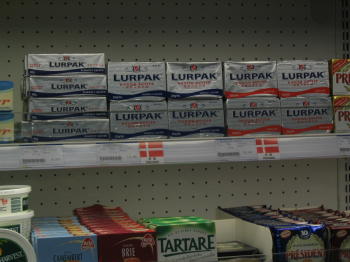We are developing the social individualist meta-context for the future. From the very serious to the extremely frivolous... lets see what is on the mind of the Samizdata people.
Samizdata, derived from Samizdat /n. - a system of clandestine publication of banned literature in the USSR [Russ.,= self-publishing house]
|
It appears the premature shutdown of the Falcon 1 engine was caused by a pad processing error. A pipe fitting was loosened by an experienced technician while working on the avionics. I would really not want to be in his shoes today.
You can read more details here.
 Engine fire is visible shortly after launch, just above the nozzle. Photo: SpaceXPS: This definitely had more serious consequences than the time my extremely souped up MGB backfired through the carburator and set the air filter on fire…

Commenters in my last post have asked me exactly what I was talking about when I stated that I found many “Danish cheeses that would be illegal in Europe” in a Chinese supermarket. Although it is actually possible to figure out what I was talking about from a careful study of the top photograph and perusal of Samizdata‘s fine archives I shall, none the less, explain myself. In truth, I was being slightly misleading.
The European Union has in recent years adopted laws (based on earlier French laws) adopted “Protected Designation of Origin” and “Protected Geographical Origin” laws concerning the names of foodstuffs, which state essentially that if a food product is supposedly characteristic of a certain place of origin, then the particular name of that foodstuff can only be used on products made in that place, and usually also made in a particular way (subject to vast books of regulations) in that particular place. Sometimes that product name is the name of the place (eg Edam cheese must come from Edam in the Netherlands), and sometimes it is not(“Camembert” cheese must come from Normandy). Nobody seriously objects to laws that make the origins of products clear, and make it illegal to genuinely attempt to deceive about where a product came from, but these laws are notable for their overreach. In many cases, the attempt has been made to regain control over names which became generic decades or centuries ago, and it has also become illegal to use these names desciptively in any sense. (You cannot say “This cheese resembles camembert” or even “This cheese does not resemble camemert” on the label). Ultimately this has ended all about being protectionist with respect to small numbers of producers.
Having adopted these laws inside the EU, the European Union’s agriculture directorate (sometimes also known as “The French”) has attempted in trade negotiations to have similar laws enacted internationally, using the argument that “We are good citizens within the EU and respect these laws and the rights of producers (blah blah blah), and therefore they should be respected internationally too. Their attempts to have such laws adopted within the WTO have largely involved their being told to get stuffed, principally by the Americans, but they have had some success in bilateral negotiations with smaller countries (eg Australia) that want to trade with the EU in agricultural products.
However, there has been a split between northern and southern Europe on this. A large number of these PDOs and PGOs have been adopted in southern Europe (particularly France and Italy) but there has been much more reluctance to adopt them in northern Europe, where farmers and producers have been reluctant to accept the large amount of regulations that has come with them. For instance, the producers of stilton cheese considerd participating, but ultimately decided that protecting the word “stilton” would reduce the flexibility of their businesses sufficiently that it was not worth doing so, although they did actually (and somewhat idiotically) adopt “Blue Stilton” and “White Stilton” as protected phrases. In the “screwups” department, the producers of Newcastle Brown Ale did apply to have the name protected, and then discovered that it was technically illegal to use the name “Newcastle Brown Ale” for beer brewed in their new brewery across the river in Gateshead.
None the less, northern European countries have (with a bit of grumbling) gone along with these laws, and products on supermarket shelves have been relabeled.
But, as I discovered in China last week, they only do what they have to. → Continue reading: More on Danish dairy products and illegal cheeses
Nice to see that those superannuated rock legends, the Rolling Stones, brushed aside the dictates of Chinese censors and bashed out some of their naughtiest tunes at a concert in China. Mind you, I cannot really see these guys going on much longer.
One consequence of the recent Danish cartoon saga has been that wherever I have travelled to recently, I have found myself in supermarkets seeking out Danish products, just to make sure that stores and customers are still offering and buying them, and that any supposed boycotts of Danish products are not working. My perception arriving in a Chinese supermarket last week was that the Chinese don’t give an <expletive> about whether anyone has drawn cartoons of the prophet Mahommed, and so I was expecting I might see a pack of two of Lurpak on the shelves or something like that. And I did.

The representation of Danish products was actually excellent, with lots of cheeses as well, including many that would be illegal in Europe. However, when one looks carefully at that picture, one discovers something much more interesting. Look at that word in the top right hand corner of the butter label.

So, there is clearly no problem. Eating this fine Danish butter is cleary fine with Allah. Nothing to worry about then.
The Economist magazine, about which James Waterton wrote a few days ago (it is getting a new editor), has an interesting cover article ‘Soft Paternalism’, chronicling the growing trend of governments to devise ways to make people behave in certain ways, usually in order to meet some supposedly desirable objective, such as losing weight, saving for a pension and so forth. I do not think the Economist hits the issue nearly hard enough but I absolutely love the picture associated with the article.
I rather like this quotation in the final paragraph:
Private virtues such as these are as likely to wither as to flourish when public bodies take charge of them. And life would be duller if every reckless spirit could outsource self-discipline to the state.
Some people, including libertarians, are a bit hard on the Economist, which often veers away from its historical attachment to free markets, liberty and limited government. I occasionally find its tone condescending but on the whole that magazine is a force for good. Let us hope that under its new editor, the Economist continues to beat the drum for classical liberalism in an era when liberty is all too often on the back foot.
Israel has a new defensive system for vehicles called ‘Trophy’, now under evaluation by the US military. I first heard of it yesterday when I came across a demo video on Fox News under the category ‘Nation’ (hurry and see it before it goes away!)
I did not uncover anything else about it until this afternoon. It appears the system is a tiny version of an anti-ballistic missile missile. The incoming RPG (or whatever) is tracked by radar and knocked out of action by what looks to me to be a kinetic energy impact kill to the head of the incoming round by a very fast little short range rocket.
What I find interesting in the Fox News video is the way the explosion plume spreads out as if the incoming hit a non-physical wall.
Also see this General Dynamics report.
Many thanks to one of our commentariat for figuring a way to link to the Fox News video!
A government is a body of people usually notably ungoverned.
– Derrial Book, the Shepard in Firefly episode War Stories
The decision reached today on US immigration policy (as a compromise on Bush’s guest worker scheme) sounds… confusing. Not to mention expensive. Three categories of illegal immigrant, each slighly more illegal than the last…. What does it mean to be a little bit legal? Is that logically similar to being a little bit pregnant?
I tend to agree with Coyote in Arizona, who is tired of defending his borders:
To answer my premise that “immigration should be legal for everyone” with the statement that “it is illegal” certainly seems to miss the point (it kind of reminds me of the king of swamp castle giving instructions to his guards in Monty Python and the Holy Grail) The marginally more sophisticated statement that “it is illegal and making it legal would only reward lawbreakers” would seem to preclude any future relaxation of any government regulation.
A lot of attention is being paid to the question of whether or not allowing immigrants in the US to seek legal status after arriving illegally constitutes an amnesty program. Seems to me of little import what one calls it. Of far more concern to me is the fact that institutionalizing a drawn-out state of official limbo as an added feature of an already drawn-out immigration process is just a bureaucratic nightmare waiting to happen.
Shall we play “name that unintended consequence”? In this case, my guess is that, just like social welfare programs, this program could create a separate class of pre-citizens working into a de facto state of indentured servitude, having bartered rights for opportunity.
Any government that creates a legally sanctioned secondary class of citizen, even if that status is temporary, is headed for trouble. By definition, you cannot make a market of ‘inalienable’ rights. And a scheme that trades citizenship for labor is nothing but a fancy breed of feudalism.
The black market in labor, where individuals strike illegal deals over gardening, harvesting, sewing or childcare, may or may not be ethical, depending on your personal philosophy, but it is voluntary in a way that government-created and government-regulated secondary labor markets cannot be.
I so need to go and drink football and watch beer.
A Samizdatista, who shall remain nameless, explaining his priorities for the day. I myself have been guilty of a few slips of the tongue. Explaining my vices to an Australian blogger, I admitted that:
I drink like a train and smoke like a fish.
My doctor agrees that I should be smoking like a fish, and he has a point. Meanwhile, I will now remove my foot from my mouth.
I have often marvelled at how people in government and business are even willing to give muslim activists with profoundly illiberal views the time of day, particularly when you consider that such activists are a minority within a minority in the western world. Yet I suppose the reason is not too hard to figure out: it all comes down to violence.
The great majority of muslim activists do not engage in violence. They may say vile things and take monstrous positions on issues at the top of their voices but they never actually put the boot in literally, let alone throw a Molotov or strap on a bomb. However they are all too quick to say things like “well I would never do something terrible like blow myself up on a bus but there are others who feel so strongly about this…”
And so people start kowtowing to the ‘spokesmen’ and ‘activists’ because a deniable lunatic fringe within a larger community which tolerates them threatens (and indeed engages in) violence.
It does make me wonder what might happen if people who oppose the intolerance and gross disregard for civil liberties that seems so deeply rooted in modern Muslim cultures started adopting the same approach. Just asking.
The latest wheeze of the EU is an online forum, probably designed to replace Wallstrom’s blog, which decayed into a morass of anodyne tedium – another puffpiece for the Commission. When will politicians understand that blogs require authenticity?
The welcome message is inaccurate: the ideology of Europe, replacing the European Union. Balkans, Ukraine, Belarus, not part of the message:
Welcome to ‘Debate Europe’, our website for the wide debate on the future of the European Union. This website is our invitation to you to discuss with us your ideas, hopes and worries for Europe’s future. With this site, we want to make contact with you and listen to what you think and propose.
There are the usual blog contributorns, haunting the official space that the EU provides for us. But the whole project is an unmitigated failure. Here are the results for the “popular” English language pages after approximately a week:
Europe’s economic and social development: 64 comments.
Feelings towards Europe: 95 comments.
Europe’s borders and its role in the world: 63 comments.
Not a roaring success!
In this month’s lead essay at Cato Unbound, ‘Why Aid Doesn’t Work,’ William Easterly makes a rational case for directing international aid dollars toward programs where the results can be objectively measured by hard scientific methods. He is persuasive, but in the end, the scientific method is still just a patch, a facsimile for what is really missing: legality.
In the developed world, the distinction between government and non-government organizations is meaningful, but not in places where government is corrupt and ineffective. In a lawless state (ie, one where corruption dominates the channels through which people get things done, for good or for ill), both aid organizations and entrepreneurial warlords effectively operate by the same rules. One’s moral orientation is not the point. If the basic sphere of operation is illegal (in the deepest sense of the word), then there is little chance that your efforts will result in enlightened, long-term improvement. Will Connors, a Chicago journalist and blogger working in Ethiopia has written compellingly about corruption in the aid community there.
Any aid-before-government aparatus is still going to break down – it will just do so further down the road. As Easterly suggests, you may demonstrably produce healthier, taller, better-educated children by buying them meat to eat twice a week, but if the best they can hope for is to grow up to be a corrupt low-level official, have you really accomplished anything lasting?
Better to see aid dollars spent as investment dollars – sunk into private businesses, rather than programs of any kind. It is possible. It is even possible that the weaker the local (corrupt) government, the greater the opportunity for leveraging capital investment. In Carol Pineau’s documentary, Africa: Open For Business, the CEO of Daallo, a Somali airline, marvels that the only reason he is able to thrive is that there is no government at all in his country. No government means no corruption, he observes dryly.
|
Who Are We? The Samizdata people are a bunch of sinister and heavily armed globalist illuminati who seek to infect the entire world with the values of personal liberty and several property. Amongst our many crimes is a sense of humour and the intermittent use of British spelling.
We are also a varied group made up of social individualists, classical liberals, whigs, libertarians, extropians, futurists, ‘Porcupines’, Karl Popper fetishists, recovering neo-conservatives, crazed Ayn Rand worshipers, over-caffeinated Virginia Postrel devotees, witty Frédéric Bastiat wannabes, cypherpunks, minarchists, kritarchists and wild-eyed anarcho-capitalists from Britain, North America, Australia and Europe.
|




